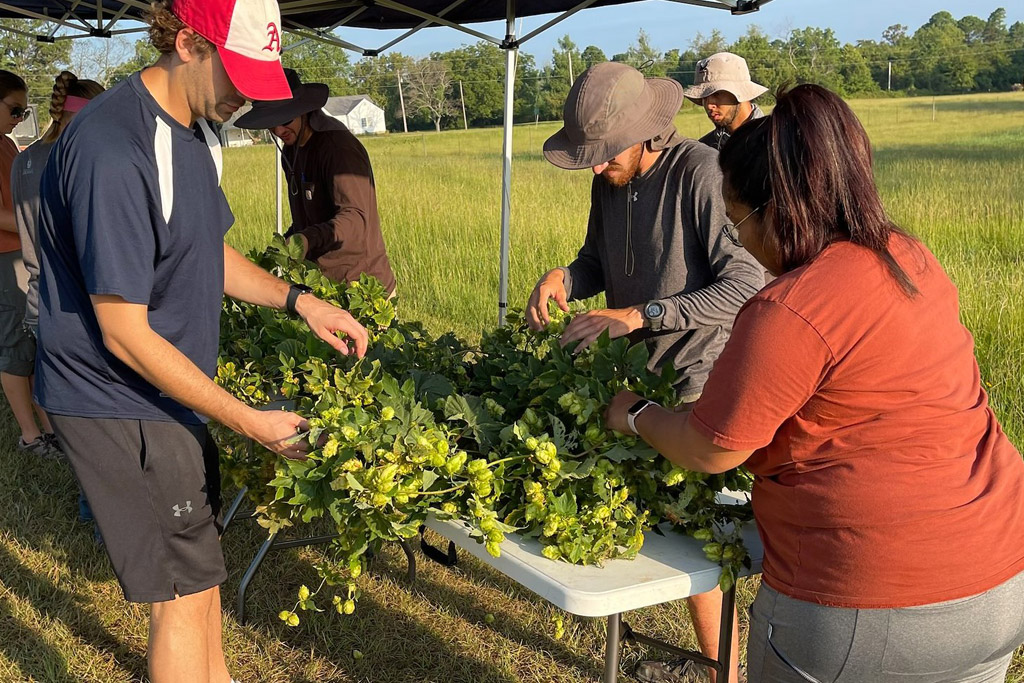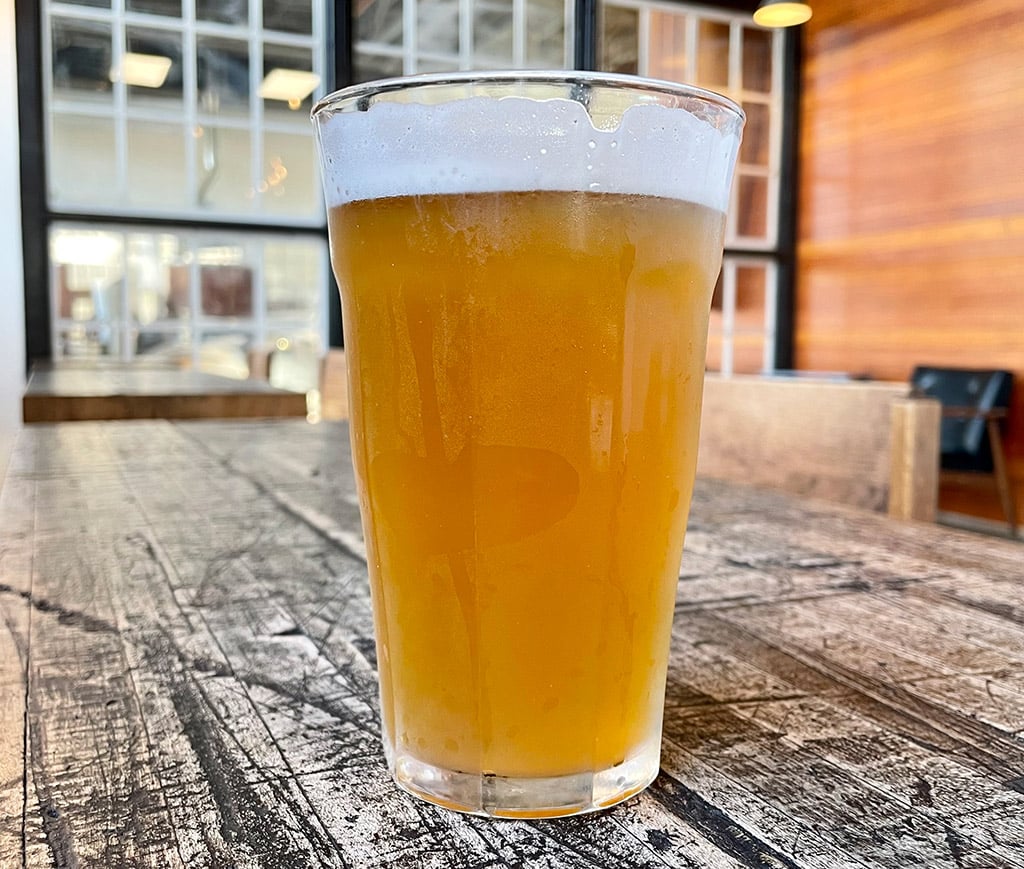 Renee Threlfall, a food scientist with the Arkansas Agricultural Experiment Station, examines hops grown at the University of Arkansas’ fruit research station near Clarksville. (UA System Division of Agriculture photo by Fred Miller)
Renee Threlfall, a food scientist with the Arkansas Agricultural Experiment Station, examines hops grown at the University of Arkansas’ fruit research station near Clarksville. (UA System Division of Agriculture photo by Fred Miller)Researchers with the Arkansas Agricultural Experiment Station recently discussed findings from a three-year study of hop cultivation in the state. They explored the viability of certain hop varieties and the feasibility of supplying the Arkansas brewing industry with homegrown hops. Their work culminated in the release of a pale ale brewed with a hop variety that showed potential for commercial production. The research station is a part of the University of Arkansas System Division of Agriculture.
Hops are a critical component of beer. Hop plants used in the brewing process produce resinous cones that contain oils and polyphenols that contribute to bitterness, aroma, and flavor in the finished product. They tend to grow best between latitudes 30° and 52°, but are at their most productive between 45° and 50°. In the United States, the majority of hops are grown in the Pacific Northwest, a region which sits inside the ideal latitude range. Traditional hop-growing regions in England and Germany are similarly-situated.
The university’s research station in Clarksville – where the hops were grown and harvested – resides at latitude 35°, or barely inside the acceptable hop growing range. Amanda McWhirt, associate professor and extension horticulture specialist, said the results of the study are encouraging, but also reflect the challenges of growing hops in the American South.
“Our yields have been less than half what is typically seen in the Pacific Northwest,” she said. “Hop cones are of a similar size or slightly smaller, but overall we get fewer cones.”
Renee Threlfall, a research scientist with the university’s department of food science, also played a critical role in the study.
McWhirt and Threlfall are experimenting with new horticultural methods and have ideas about how to increase yields. Going head-to-head with Oregon and Washington, however, will remain a nearly impossible challenge due to environmental conditions here in Arkansas. Hops prefer longer days, milder summers, and lower humidity levels than what we experience in the Natural State.
“Hop yields in Arkansas will never be comparable to the Pacific Northwest with the same cultivars due to daylight and climatic differences,” she said. “We will be exploring new cultivars in the coming season, and we are collaborating with North Carolina State University’s hop breeding program as they develop cultivars for the southeastern United States.”
 Research technicians and graduate students with the University of Arkansas System Division of Agriculture sort a hops harvest at the UA’s fruit research station near Clarksville. (UA System Division of Agriculture photo by Sarah Cato)
Research technicians and graduate students with the University of Arkansas System Division of Agriculture sort a hops harvest at the UA’s fruit research station near Clarksville. (UA System Division of Agriculture photo by Sarah Cato)“Terroir” is a concept better known in the wine world. The term refers to the unique flavor profile imparted on grapes by the soil and climate where they are grown. The same variety of grape grown in two different places can potentially demonstrate different characteristics in the finished product (when all other variables are controlled). Researchers believe the same is true for hops.
“Alpha and beta acids [in the hops] are different here in Arkansas,” said McWhirt. “They are generally lower in both measures when compared to the same cultivars grown elsewhere. The feedback has been that Arkansas hops are much ‘milder’ and less ‘harsh.’ Brewers have commented that the lower acids might be a good thing because they don’t hide some of the other aromas and flavors in the beer.”
Alpha acids are the compounds that create bitterness in beer. Beta acids are not as straightforward in their explanation, but are generally thought to affect oxidation and the stability of bitterness in the hop cone over time.
As for the cultivars grown as a part of the three-year study, Cascade and Zeus showed the most potential for commercial production in Arkansas, with Crystal and Cashmere showing moderate promise based on yield, plant health, and vigor.
Last month Ivory Bill Brewing Co. in Siloam Springs released a pale ale brewed with Crystal hops grown by the research team. Co-owner and brewmaster Casey Letellier was able to secure the entire yields of Crystal from 2021 and 2022, or about seven pounds total. A one-barrel batch of Arkansas Crystal Pale was the result.
“I’m very excited about using Crystal,” said Letellier. “It’s an American hop variety that can stand in for those really elegant European aroma hops. Crystal has some of those lovely spice notes that are grounded in the old world, but also has fruity floral notes that are more new-world.”
 A glass of Arkansas Crystal Pale is shown at Ivory Bill Brewing Co. in Siloam Springs. (Brian Sorensen)
A glass of Arkansas Crystal Pale is shown at Ivory Bill Brewing Co. in Siloam Springs. (Brian Sorensen)Even with the potential for hardier hop varieties and improved cultivation methods, it is not likely that crop yields in Arkansas would meet the needs of the state’s brewers. It is more reasonable to think that locally-grown hops can be used in beers made in small volumes for special purposes.
“I think Arkansas grown hops could be used to add unique flavors and to market beers made with local ingredients,” said McWhirt. “Casey [Letellier] commented that a good place to use Arkansas-grown hops would be toward the end of the brewing process, to highlight the unique flavors and aromas. The bulk of the hops used earlier in the brewing process would likely still need to come from other regions due to price and the volume needed.”
Hops used at the beginning of the wort boil impart bitterness but no flavor or aroma, and are therefore indistinguishable and interchangeable. Hops used towards the end of the boil – or during or after fermentation (“dry hopping”) – provide nearly all of the flavor and aroma. Letellier said he loaded all of the Arkansas-grown Crystal hops at the end of the brewing process for maximum sensory effect.
Researchers will continue to experiment with different hop cultivars and will collaborate with Arkansas brewers to gauge the performance of those hops in finished beer. Stone’s Throw Brewing in Little Rock and Prestonrose Farm and Brewing Co. in Paris are slated to brew with other varietals grown by the research team.
“Feedback from the brewers will be very important to determining if growers will eventually adopt this crop,” said McWhirt.



